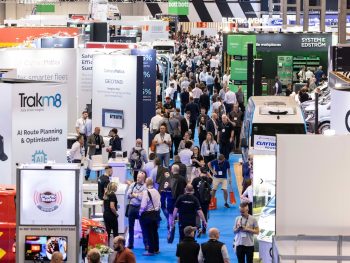The Commercial Vehicle Show marked its 25th anniversary by spotlighting the challenges to decarbonise road transport and the technologies and policies available.
 Held last month, the event united OEMs, policymakers, infrastructure experts and operators to discuss and give guidance on how to accelerate the shift to zero-emission vehicles.
Held last month, the event united OEMs, policymakers, infrastructure experts and operators to discuss and give guidance on how to accelerate the shift to zero-emission vehicles.
Commercial vehicles are responsible for 36% of all road transport CO2 emissions and 12% of the UK’s total, giving rise to immense challenges.
But there are plenty of opportunities, as highlighted across the 2025 CV Show at the NEC Birmingham, where more than 250 exhibitors and over 13,000 visitors came together to explore the solutions available.
Product launches from Renault, Farizon and Isuzu reflected the sector’s commitment to electrification. Vehicles on display at the show include purpose-built BEVs, electric refrigerated vans and smart fleet tools.
Ford UK revealed one in four of its vans will be electric by next year, while Renault reinforced its new partnership with Flexis, an upcoming all-electric CV platform.
Yet despite this momentum, uptake remains behind target. Just 6.3% of new vans are currently electric, though this is forecast to rise to 9.6% in 2025 and 15.2% in 2026. With only 0.5% of HGVs currently decarbonised, progress in the heavy sector is slower still.
Opening the show, Mike Hawes, SMMT chief executive, praised industry progress but warned that fundamental barriers persist.
“The pace of transition needs to accelerate. Grid connections are too slow. All depots must be connected. Four public HGV chargers nationwide is nowhere near enough. We need consistent planning policy, and action on energy costs, which are 60% higher than the European average. Operators cannot make a compelling case for investment until those costs come down.”
Chris Ashley, RHA senior policy lead, also launched a roadmap focused on five priorities: cost, infrastructure, vehicle performance, skills and mindset. He said that the shift will require up to £100bn of investment and a clear plan to ensure working vehicles stay operational while adopting zero-emission alternatives.
At the EV Café Village, operators and local authorities shared real-world experience from the front lines of fleet decarbonisation. Speakers from National Grid, Drax Electric, Scottish Water and Dawson Group called for infrastructure-first strategies, driver engagement, phased depot upgrades and clear stakeholder mapping.
Electrification isn’t just about vehicles, they argued, it requires cultural change, planning permissions, energy expertise and local collaboration. Spokespeople from local authorities including Islington, Oxford, Nottingham, and Suffolk County echoed this sentiment, positioning fleet transition as a wider investment in public health and sustainability, not just compliance.
The event’s organisers added: “From depot electrification to upskilling engineers, and cross-sector partnerships to policy reform, the CV Show made the industry aware that the commercial vehicle sector is ready to lead.”

